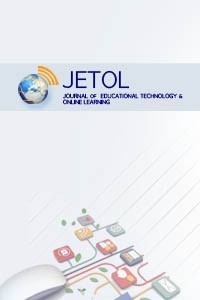Review of student opinions on blended educational implementations in the pandemic process: A case study
Review of student opinions on blended educational implementations in the pandemic process: A case study
flipped classroom, emergence remote teaching, distance flipped classroom, blended education vocational school,
___
- Bergmann, J. and Sams, A. (2012). Flip Your Classroom: Reach Every Student in Every Class Every Day. Colorado: International Society for Technology in Education.
- Bergmann, J., & Weddell, D. (2013). To flip or not to flip? Learning & Leading With Technology, 39(8), s. 6-8. http://www.learningandleading-digital.com/learning_leading/20120607?pg=8#pg8
- CHE. (2021). Üniversitelerdeki kovid-19 tedbirlerini ve eğitim süreçlerinin çerçevesini belirledi [Determined the covid-19 measures and the framework of education processes in universities]. Yükseköğretim Kurulu Başkanlığı [Council of Higher Education[: https://covid19.yok.gov.tr/Sayfalar/HaberDuyuru/yok-ten-covid-19-tedbirlerine-yonelik-uygulama-rehberleri.aspx
- Cohen, J. (1960). A Coefficient of agreement for nominal scales. Educational and Psychological Measurement, 20(1), s. 37-46. doi:https://doi.org/10.1177/001316446002000104
- Creswell, J. (2013). Research Design: Qualitative, Quantitative, and Mixed Methods Approaches. California: SAGE Publications.
- Daniel, S. (2020). Education and the COVID-19 pandemic. Prospects, 49, s. 91-96. doi:https://doi.org/10.1007/s11125-020-09464-3
- Fautch, J. M. (2015). The flipped classroom for teaching organic chemistry in small classes: is it effective? Chemistry Education Research and Practice, 16, s. 179-186. doi:10.1039/C4RP00230J
- Hodges, C., Moore, S., Lockee, B., Trust, T., & Bond, M. (2020). The Difference Between Emergency Remote Teaching and Online Learning. EDUCAUSE REVIEW: https://er.educause.edu/articles/2020/3/the-difference-between-emergency-remote-teaching-and-online-learning
- Jaster, R. W. (2017). Student and instructor perceptions of a flipped college algebra classroom. International Journal of Teaching and Learning in Higher Education, 29(1), s. 1-16. http://www.isetl.org/ijtlhe/pdf/IJTLHE2323.pdf
- Jeong, J. S., Gonzalez-Gomez, D., & Canada-Canada, F. (2016). Students' perceptions and emotions toward learning in a flipped general science classroom. Journal of Science Education and Technology, 25(5), s. 747-758. doi:10.1007/s10956-016-9630-8
- Jia, C., Hew, K., Bai, S., & Huang, W. (2021). Adaptation of a conventional flipped course to an online flipped format during the Covid-19 pandemic: Student learning performance and engagement. Journal of Research on Technology in Education, Early Release. doi: https://doi.org/10.1080/15391523.2020.1847220
- Long, T., Logan, J., & Waugh, M. (2016). Students' perceptions of the value of using videos as a pre-class learning experience in the flipped classroom. TechTrends, 60(3), 245-252. https://doi.org/10.1007/s11528-016-0045-4
- Ma, W., & Luo, Q. (2021). Pedagogical practice and students’ perceptions of fully online flipped instruction during COVID-19. Oxford Review of Education, Early Release. doi:https://doi.org/10.1080/03054985.2021.1994382
- Mason, G., Schuman, T., and Cook, K. (2013). Inverting (Flipping) Classrooms - Advantages and Challenges. 120th ASEE Annual Conference & Exposition, Atalanta.
- Merriam, S. (2009). Qualitative research : a guide to design and implementation. San Francisco: Jossey-Bass.
- Montacute, R., & Holt-White, E. (2021). Covid-19 and the University Experience. London: The Sutton Trust. https://dera.ioe.ac.uk/37749/1/Covid-19-and-the-University-Experience.pdf
- Mooring, S. R., Mitchell, C. E., & Burrows, N. L. (2016). Evaluation of a flipped, large-enrollment organic chemistry course on student attitude and achievement. Journal of Chemical Education, 93(12), s. 1972-1983. doi:10.1021/acs.jchemed.6b00367
- Sanandaji, A., & Ghanbartehrani, S. (2021). An evaluation of online flipped instruction methods during the COVID-19 pandemic. Journal of Information Technology Case and Application Research, 23(1), s. 46-67. doi:https://doi.org/10.1080/15228053.2021.1901360
- Sletten, S. R. (2017). Investigating flipped learning: Student self-regulated learning, perceptions, and achievement in an introductory biology course. Journal of Science Education and Technology, 26(3), s. 347-358. doi:https://doi.org/10.1007/s10956-016-9683-8
- Yılmaz, Y., Karabulut, H., Uçar, A., & Uçar, K. (2021). Determination of the education technology competencies of special education teachers. European Journal of Special Education Research, 7(2), s. 71-83. doi:http://dx.doi.org/10.46827/ejse.v7i2.3734.
- Yu, Z. & Gao, M. (2022). Effects of video lenght on a flipped english classroom. SAGE Open, doi: https://doi.org/10.1177/21582440211068474
- ISSN: 2618-6586
- Yayın Aralığı: Yılda 3 Sayı
- Başlangıç: 2017
- Yayıncı: Gürhan DURAK
Technology integration in teaching English as a foreign language: A content analysis study
Parents’ views on distance education during the Covid-19 pandemic
A content analysis of studies published in the field of augmented reality in education
Mahmut Emre TURHAN, Mustafa METİN, Ebru EZBERCİ ÇEVİK
Dilara BAKAN KALAYCIOĞLU, A.ömer TOPRAK, Cem EYERCİ, Zeynep UGUR, Ayşe GÜÇ, Sıtkı YILDIZ, Metin TOPRAK, Zekiye DEMİR, Ömer DEMİR, Ömer Faruk YILDIZ, Ramazan ÇELİKKAYA
Endam DÜZYOL, Günseli YILDIRIM, Güzin ÖZYILMAZ
Pınar ŞAHİN-DURMAZ, Naciye KUNT
High school students’ experiences with emergency remote teaching
Çiğdem HAN TOSUNOĞLU, Selim ARSLANOĞLU, Zeynep BALABAN, Şule ELEMAN, Esengül KANTEKİN
